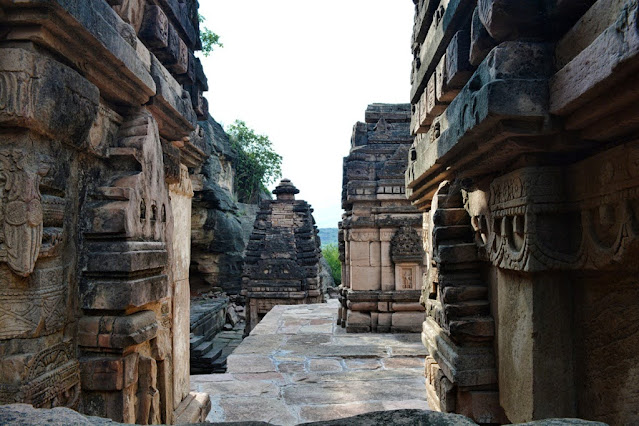Nareshwar Group of Temples –
The Group of Temples
Nareshwar group of temples consists of mainly three clusters of temples. The first cluster consists of small shrines with pyramidal roofs in upper region of the valley surrounding rock cut tank. The second cluster consists of similar smaller shrines and few larger shrines on a hill flanking the northern side of the valley. There are about remains of two larger shrines in this cluster. Much of these shrines were lost due to the ravages of time only the basements and the parts of the doorframes remains.
The third cluster is the architecturally most important among the temples in Nareshwar. It is situated on the lower elevation of the hill near a ravine. There are about 22 temples situated on three sides of the hills and follows nagara style architecture. The temples stand on three levels of terraces and a tank is located in front of the main shrine. Most of the shrines consists of sanctum and antrala without any entrance porch. Most of the shikaras follow nagara style.
The exteriors of their walls are adorned with figure sculptures. One of the shrine is surmounted with Vallabi style (barrel shaped) shikara. The Valabhi shrine is dedicated to goddess Durga. It is a small triratha shrine with a rectangular sanctum and a superstructure of mixed type with a Valabhi sikhara over a single storey Nagara base. Some of the temples have the peculiar plan of a pancharatha jangha and triratha shikhara. The jangha of the temples contains bhadra niches in pilasters and pediments.
The doorways of these shrines are intricately carved. The figures of Ganga and Yamuna along with their attendants flank both sides of the door while other deities, surasundaris are on the three niches on both of the two pillars. The lintel of these temples displays the Navagrahas, Saptamatrikas and Ganesha, and other deities. The main deity of the shrine is generally carved in the dedicatory block on the centre of the lintel. Sculptures of various deities belonged to the Hindu pantheon excavated from Nareshwar are now preserved in the Gwalior Museum.

.jpg)


.jpg)




.jpg)

.jpg)

No comments:
Post a Comment